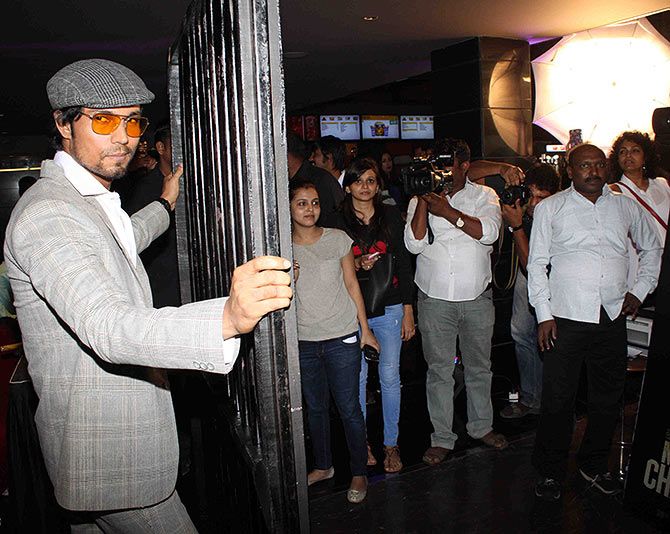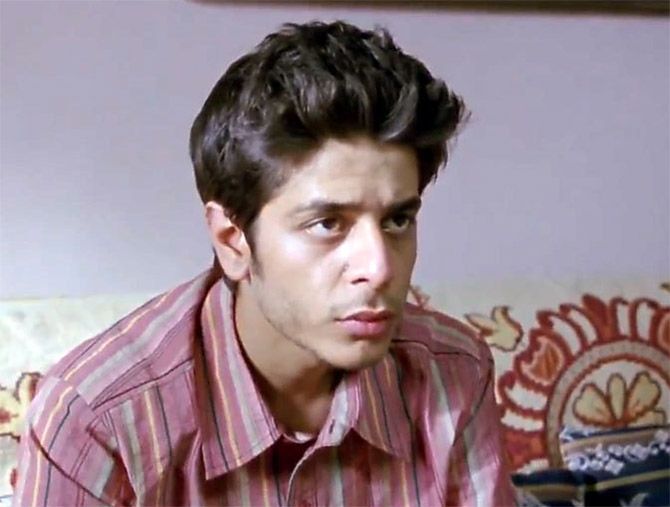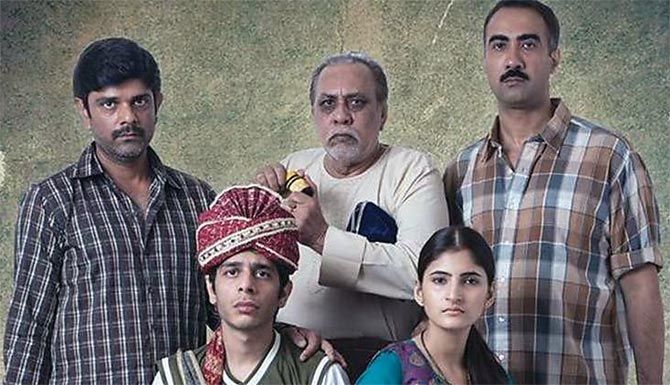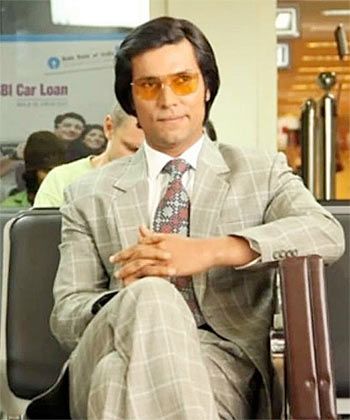'Both Main Aur Charles and Titli are essentially stories of two plot-devices that became protagonists.'
'You cannot relate to Titli or Charles, without submitting to the knowledge that neither of them are well-rounded characters; they are more like artifacts -- Charles, a schlock artifact and Titli, an artifact of spirit toughened by years of live brutality,' says Sreehari Nair.
 'Randeep Hooda,' says Sreehari Nair, 'is perhaps the Fred Astaire of posture and here as Charles Sobhraj, what the actor gets spot-on is the poise that a character of this nature demands. It's not the exact poise of Charles Sobhraj perhaps, but the poise of Sobhraj as inferred by someone trying to interpret his allure.'
'Randeep Hooda,' says Sreehari Nair, 'is perhaps the Fred Astaire of posture and here as Charles Sobhraj, what the actor gets spot-on is the poise that a character of this nature demands. It's not the exact poise of Charles Sobhraj perhaps, but the poise of Sobhraj as inferred by someone trying to interpret his allure.'
If there's one grouse that can be expressed about the title character in Kanu Behl's Titli, it's that he is consistently so morose. If there is one complaint that can be registered against the lead in Prawaal Raman's Main Aur Charles, it's that he is consistently so charming. To an average viewer -- someone who spends a good portion of his life groaning about his supermarket purchase-list or excitedly leaning out of his car window to watch a brawl on the street -- these characters' complete surrender to just one emotion or tone, might read as unreal.
The fact of the matter, however, is that both Main Aur Charles and Titli are essentially stories of two plot-devices that became protagonists. You cannot relate to Titli or Charles, without submitting to the knowledge that neither of them are well-rounded characters; they are more like artifacts -- Charles, a schlock artifact and Titli, an artifact of spirit toughened by years of live brutality.
Right from the time you first see him, something about Titli's gaze hits you on a very gut-level. His daytime eyes reveal the burden of having stayed up the night before; even as his two brothers and father sleep like logs in the adjacent room. The brothers carry out acts of gruesome violence where Titli joins them as a ringer, mostly observing -- and what he observes, he hates. He is like the nameless character from Kieslowski's Decalogue and Max the Butler from Sunset Boulevard, rolled into one.
His upper body looks almost crippled and his walk, sort of borders on Chaplinesque. The brothers' acts of violence are partly for sustenance (that's their defence to the world) and partly to prove their masculinity to themselves.
Titli on the other hand has a feminine side to him -- his face is distinctly effeminate, and he seems to have borrowed more from his dead mother, than from his father -- and like most women, he is silently resilient.
Titli's resilience almost plays out like numbness and that I think is at the core of the movie -- the sheer numbness that comes with having witnessed sustained amorality and cascading violence.

Like Titli, Randeep Hooda in Main Aur Charles, too seems like he is numbed himself out. From what I have seen of him, Hooda is perhaps the Fred Astaire of posture and here as Charles Sobhraj, what the actor gets spot-on is the poise that a character of this nature demands. It's not the exact poise of Charles Sobhraj perhaps, but the poise of Sobhraj as inferred by someone trying to interpret his allure. And because he mixes this poise with a smile that hardly leaves his face, Charles' numbness, unlike Titli', hits you as 'cool detachment.'
As Charles, Hooda converses in many languages and while his French is not exactly Louis XIV-quality French, you realise that the language he speaks best is the language of loners. Documentaries about Charles Sobhraj claim that he preyed on people who craved for adventure. The movie goes deeper: It portrays Charles as an insulator -- someone who believed that his biggest gift is insulating people from the rigours of everyday life.
His victims were mostly those to whom if Charles asked politely if he could kill them, would thrust their wrists forward and say, 'This vein, please.'
That Charles preyed on people who craved for adventure is only half-true; he essentially preyed on people who loved 'dangerous little games.' When dealing with people who longed for 'otherworldly' experiences, Charles would literally send them 'there.' The character -- again, clearly a plot-device -- is an exquisite hybrid of a spiritually-evolved talker and clinical executioner, and Hooda using his immobile jaw and smooth-moving lips to great effect, nails it absolutely.
The brilliance of Shashank Arora's (who plays Titli) and Randeep Hooda's performances lies in their understanding that they are playing abstractions of certain ideas. And that being the case, it's extremely important their characters be surrounded by actors and seeped in atmospherics that lend credence to these ideas. This to me was where Main Aur Charles scored over Titli.
Adil Hussain in Main Aur Charles -- playing Commissioner Amod Kanth -- has the most well etched-out character of both movies put together. And while the pursuit of Charles initially starts off as a mere official endeavour, the subtext suggested very strongly is that a bit of sexual jealousy does take over the proceedings.
That to me, was the jazziest bit in Main Aur Charles -- Kanth's questioning of how women could fall for an evil, smooth-talking and evidently-deceptive character like Charles, and whether his personal brand of uprightness (that once helped men 'score') was slowly fading out.
When his wife, in a restaurant, expresses her excitement about the 'criminal,' Hussain's Kanth almost pulls the tablecloth out, and it's a great moment -- you get the central questions that Main Aur Charles is intending to ask; questions that somehow don't come to the fore in the movie's first 30 minutes, owing to its over-commitment to snappiness.
However, once the snappiness wears out and the real story of Main Aur Charles starts to appear, the film's strengths also become more apparent. You realise that the true sensuality of the movie doesn't lie in the overtly hip-shaking numbers or the party scenes. On the contrary, the sensuality is in those little moments like Kanth's aforementioned scene with his wife, or when Hooda's Charles explains to a foreigner why Parisians hate the Eiffel Tower and see it as ugly, or that passing scene where he talks about his relationship with God -- a moment where you feel like you are getting an entry into his almost impenetrable heart.

While Main Aur Charles isn't ashamed of dramatising its ideas, Titli never quite succeeds in doing so, principally because it puts so much effort into coming across as unflinching.
Like his mentor Dibakar Banerjee, Kanu Behl too casts actors well but just like Mr Banerjee he doesn't quite allow them to breathe.
I might be in the minority who thinks Ranvir Shorey -- whose biggest strength clearly is improvisation -- is here saddled with a character that inherently doesn't allow him to experience a sense of discovery. Shorey gives the character everything he has, but you feel like he is improvising as Shorey and not as the character. Consequently, his Vikram comes with the ferociousness and gentleness of the actor himself, but nothing that's sourced from the material.
My major problem with Titli is that the story of the three brothers and their father never quite extends beyond their walls and becomes a microcosm of a larger syndrome. If there is one quality that binds the greatest Dysfunctional Family stories, it's in the way they remind you, how, your very own 'Normal Family' might also be precariously close to being labeled as 'Dysfunctional.'
In my reading, the fact that we watch the family in Titli and it hits us as nothing more than a 'Dysfunctional Family' might just be the movie's biggest failure.

Make no mistake; I don't think a comparison of the two movies is a comparison of the austere settings of Titli and the almost vinegary settings of Main Aur Charles. The comparison arises because the protagonists in both these movies are essentially forethoughts and they represent the two ways in which evil works you over -- it either makes you apathetic or turns you into a self-styled version of your own evilness. But because Main Aur Charles accepts its own trashy tonality and doesn't try to resolve your feelings for its lead, it pulls you into a high without issuing a notice.
Titli on the other hand, in its devotion to its own graveness, issues a silent apology that is almost delivered in good taste. These movies prove -- just like Hooda's rambling about the obligation to be evil -- that the need to be trashy is sometimes more honest than the desire to be arty.










